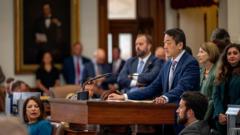The intense rivalry over congressional maps between California and Texas is a pivotal flashpoint ahead of the upcoming midterm elections, as both states' decisions could significantly influence political power in Washington.
### Redistricting Showdown: California and Texas Lock Horns Over Congressional Seats

### Redistricting Showdown: California and Texas Lock Horns Over Congressional Seats
California and Texas are embroiled in a contentious redistricting struggle that may radically redefine political dynamics in the U.S.
Lawmakers in California and Texas are engaged in a fierce political confrontation over congressional redistricting, which is expected to play a vital role in shaping the balance of power in Washington, D.C. These two populous states, home to over 70 million Americans, are setting the stage for a high-stakes battle that tests party strength and control heading into the midterm elections.
As Texas moved forward with a legislative measure to add congressional seats, thereby strengthening Republican representation, California retaliated by approving a redistricting plan intended to offset Texas's advantages. California's proposal will be presented to voters in November, making the rivalry not just a legislative issue but also a matter for public decision.
This conflict over redistricting sparked in Texas, where the Republican-controlled legislature decided to re-draw congressional boundaries mid-decade, a controversial move aimed at securing five additional seats in Congress for the GOP. Meanwhile, California’s accompanying effort seeks to enhance Democratic representation in the state.
Redistricting, or the process of delineating electoral boundaries, is typically shaped through state legislatures or independent commissions, depending on the state. The outcome can significantly influence election results by determining the ideological leanings of districts and their elected representatives.
With the House of Representatives sitting on a precarious edge, Democrats are just three seats shy of flipping the majority. Historically, the party in power tends to lose seats during the midterm elections, amplifying the pressure for both political sides to control redistricting to manipulate voter outcomes.
Throughout this debate, former President Trump has voiced support for Republican-led redistricting efforts, encouraging state legislatures across the country to undertake similar measures to sustain GOP interests. However, Texas's initiative faced resistance when Democratic lawmakers temporarily fled the state to block the quorum necessary for a vote.
Redistricting, especially when driven by partisan motives, often leads to allegations of gerrymandering. While both parties employ this strategy, it has raised ethical questions about the integrity of the electoral process. Democratic groups challenge Texas's new maps, arguing they undermine minority voting rights and violate the federal Voting Rights Act.
Despite criticism, the process persists, with the potential for legal battles surrounding politically motivated gerrymandering. The Supreme Court has previously limited federal intervention in such disputes, thereby leaving the redistricting landscape largely to state decisions.
Moving forward, both states could significantly influence the political landscape in the 2026 midterms and reshape congressional representation. Other states with partisan aspirations, like Illinois and Florida, are eyeing similar moves following Texas's example, indicating an expanding battleground in the redistricting fight.
In California, the governor's commitment to counter Texas's actions reflects the urgency for Democrats to safeguard their representation in Congress. However, California's process is hampered by laws designed to minimize political bias in redistricting, making rapid changes complex.
Ultimately, as California and Texas navigate the intricate and often contentious waters of redistricting, the implications of these actions will resonate beyond state boundaries—potentially redefining electoral outcomes and shaping the future of American governance.





















